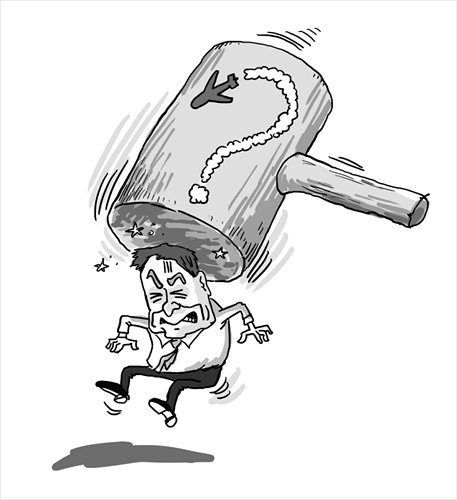Malaysia’s political rivalries bedevil search for lost MH370 flight

Illustration: Liu Rui/GT
Two weeks have passed since MH370 disappeared. Rumors about the cause have gone viral on the Internet, and various conspiracy theories have been created. Many pointed toward the domestic political and social interplays within Malaysia.
Before the present incident, Malaysia Airlines boasted one of the safest records worldwide. Did it become complacent? Perhaps. In retrospect, the Malaysian authorities could have done better in devising a comprehensive major emergency response mechanism.
At the onset, there was one particular aspect of the handling of the incident which irked both the family members and the media. Various Malaysian authorities were involved in the search operations, ranging from transport to the military, and often conflicting morsels of information were issued by each, causing confusion and further grief. This has led some to question the professionalism of the Malaysian authorities.
But the professionalism and dedication of the Malaysian frontline search and rescue teams should not be doubted, as they have proven their worthiness internationally. In the 1990s, when Malaysian troops joined the UN peacekeeping force in Somalia, they were part of the rescue team that relieved US forces during the Battle of Mogadishu in 1993.
This negative perception of Malaysian handling of the present incident may be caused by two features in Malaysia's political environment that are alien to most Chinese.
First, as in other commonwealth countries, Malaysia's public service system distinguishes between civil servants who are career professionals usually working in the same department until retirement and thus cultivated particular expertise, and members of the administration, who are politicians.
Serving civil servants cannot become the political heads of their departments. Members of the administrations are as ministers, deputy ministers and political secretaries. However, all of them serve at the pleasure of the prime minister, who is in turn answerable to a democratically elected parliament.
Such politicians obviously are often not professional or even well-versed in the particular ministry they happen to head. And unlike China or the US, Malaysia has not installed a "spokesperson" system. The press conferences are chaired by the various politicians in person. When facing the onslaught of the international media, some politicians shine while others wane.
Second, superficially Malaysia practices a centralized political system in which the prime minister or ruling party president devises policies and subordinate departments dutifully and diligently execute them.
In reality, to make it to the top of the Malaysian political hierarchy, politicians need to assemble a group of influential supporters. These political supporters in turn grab more supporters, and the same pattern persists all the way down to the level of the average voters.
In order to retain their supports, high-level politicians have to dish out various types of political largesse, most prominent of which is a ministership. Once appointed a minister, the politician will typically develop his ministry into essentially a personal fiefdom.
And since rivalry is rife among most politicians, inter-departmental cooperation or even just coordination is extremely difficult, even in the face of a major crisis.
This could also help explain why it took almost a week before a lead agency was appointed to coordinate the handling of the MH370 search efforts.
Malaysian political reality dictates that some ministers will not accept being led by others, for fear of losing face.
But paradoxically, as the resolution of the present incident may drag on and thus attract further criticism of weak leadership, understandably none of the ministers concerned are particularly keen to shoulder the lead.
Rumors, especially on the Internet, thrive for and against both sides. Some suspect that the ruling coalition is hiding some crucial information about the vanished flight. Others insinuated that pilot, who is a supporter of the opposition coalition, might have been involved. But leaks are common in Malaysian politics, and such a conspiracy could hardly remain sealed under the international spotlight.
It is simply not in the social psyche of a relatively peaceful society like Malaysia for people to engage in acts of terrorism to make political statements. Malaysians prefer to make our dissatisfaction known at the ballot box.
The author is a senior fellow with the S. Rajaratnam School of International Studies, Nanyang Technological University, Singapore. opinion@globaltimes.com.cn
Read more in Special Coverage: